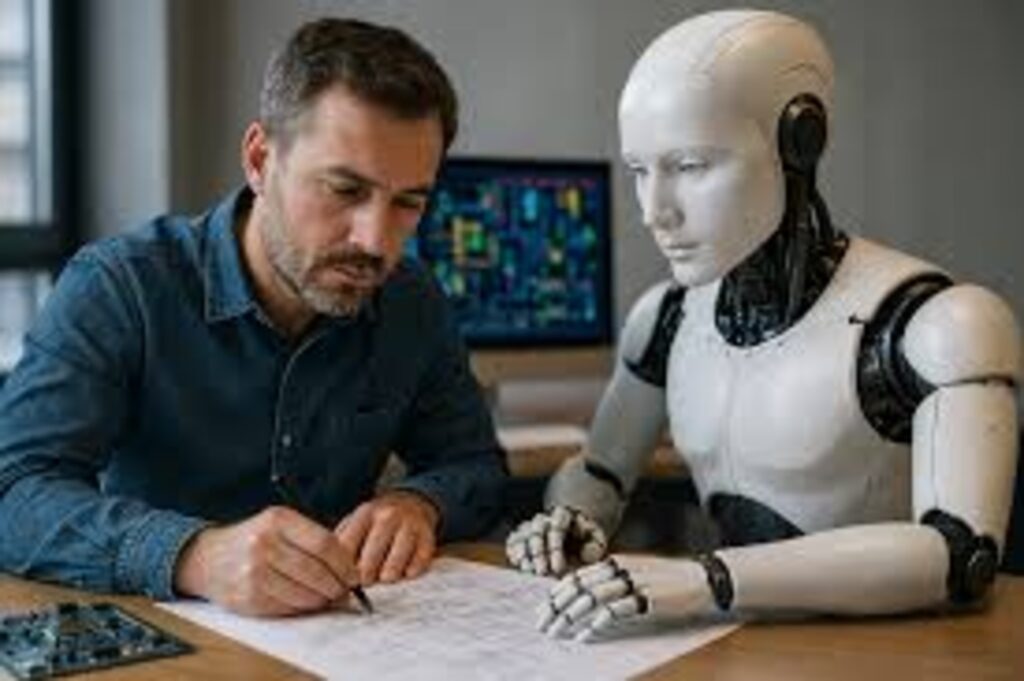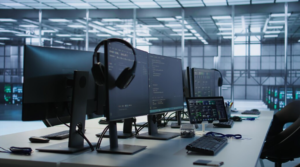AI Hardware Development: Pioneering the Future of Intelligent Systems

Artificial Intelligence (AI) has changed the digital age by being able to imitate human intelligence, automate and make decisions based on data. Although the software development has been receiving most of the attention, AI hardware development is the real key to AI innovation. The algorithms and models, which constitute AI, would only be theoretical models and not practical tools that are transforming industries, without powerful, specialized hardware.
In this paper, we will discuss the meaning of AI hardware development, why it is such a critical development, the most recent trends, challenges, and the extent to which it has affected other industries, such as the healthcare, and autonomous vehicles.
It is AI Hardware Development.
The development of AI hardware is the design, engineering, and optimization of physical computing units with artificial intelligence workloads in particular. In contrast to the conventional hardware, which is used in general computing activities, AI hardware is optimized to handle vast data sets at high rates, often in real time, and with very low energy consumption.
Tensor Processing Units (TPUs): Google implements its own machine learning workload processors, specifically deep learning.
Field-Programmable Gate Arrays (FPGAs): Reconfigurable hardware which can be customized to particular AI uses
Application-Specific Integrated Circuits (ASICs): chips that are specifically used to execute specific AI functions, which are not only efficient but also faster.
The development of AI hardware is thus concerned with developing high power, performance, and scalable tools as a means of facilitating smarter applications of AI.
What is the significance of AI Hardware Development?
- Processing Data in huge quantities.
Deep learning AI applications need to be trained on datasets containing billions of parameters. These cannot be effectively managed using traditional CPUs. Ai hardware designed to perform specific tasks in AI models faster and enables large-scale training.
- Real-Time Processing Needs
Real-time decisions are needed in autonomous vehicles, robotics, and IoT devices. The hardware of AI can be used to provide the computations in time such that it does not introduce delays which are disastrous in a safety-critical system.
- Energy Efficiency
Executing intricate models of running is very power-intensive. The current AI hardware development is aimed at optimizing performance and decreasing energy consumption, therefore, AI implementation is sustainable.
- Scalability and Availability.
AI hardware allows AI to run on a wide platform and industries, including large cloud data centers, all the way down to edge devices such as smartphones.
Important Trends in the Development of AI Hardware.
Edge AI Hardware
Rather than transmitting all information to the cloud, AI is being more and more run on computers on devices, like smartphones, drones, and sensors. Edge hardware makes decisions quicker, more secure, and enhances faster decision-making.
Neuromorphic Computing
Neuromorphic chips are based on the human brain and they replicate neural structures to enhance the efficiency of AI computations, especially cognitive computations.
Quantum Computing
Although in their early development, quantum processors have the potential to execute AI calculations at record speed, tackling some problems that cannot be executed at all on classical hardware.
Heterogeneous Architectures
Hybrid systems of CPUs, GPUs, FPGAs, and ASICs are increasingly popular to trade flexibility, cost, and performance.
Energy-Aware AI Chips
New hardware architectures focus on minimizing the power used, as well as high-performance, which is essential to the use of AI in the long term.
Uses of AI Hardware Development.
Healthcare
AI devices are used to speed up the analysis of medical imaging, drug discovery, and predictive diagnostics. There is faster patient care and more accurate results, as well as ensured by the real-time processing.
Autonomous Vehicles
Self-driving cars use AI hardware to compute sensor data (such as LiDAR and cameras) in real time so that they can navigate safely and in real time.
Finance
The AI hardware enhances the process of fraud detection and algorithmic trading as well as risk management by analyzing data more quickly.
Smart Manufacturing
Predictive maintenance, quality control, and process automation in factories are conducted with the help of AI-enabled robotics as a result of specialized hardware.
Consumer Electronics
Since AI assistants in phones to smart home equipment, the creation of AI hardware can guarantee a smoother performance and greater user experience.
Issues with AI Hardware Development.
High Costs
The research and production of specialized AI chips is very costly, and it may be inaccessible to small business entities.
Rapidly Evolving AI Models
The complexity of AI models will require hardware improvements to match them as fast as possible, and this cycle will keep on innovating.
Energy Demands
Efficiency improvement is a positive trend; however, large AI models demand a huge amount of energy, which is a matter of sustainability.
Scalability Issues
This is a never-ending problem of ensuring that hardware is compatible across devices and industries.
Global Supply Chain Risks
AI hardware development and deployment can be interfered with by chip scarcities and geopolitical problems.
AI Hardware Development of the Future.
The future is in smaller smarter and more sustainable chips. As the need to use AI in consumer electronics, healthcare, defense and industrial automation grows, we can anticipate:
More AI in the Edge: Machines will be less dependent on cloud servers.
Industry-Specialized Chips: Niche custom chips will be created.
IoT integration: AI hardware will be used in conjunction with IoT devices without any disruptions.
Sustainable Innovation: Power-saving designs will solve the environmental issues but it will encourage scalability.
Finally, the development of AI hardware will determine the speed of AI development in the world.
Questions and Answers on AI Hardware Development.
Q1. What is the development of AI hardware?
The hardware development of AI is the development of special computing hardware such as GPUs, TPUs, and ASICs to perform artificial intelligence tasks. such as machine learning, deep learning, and data analysis, faster than general computers.
Q2. Why do we require dedicated hardware in AI?
The AI workloads demand huge computing power and real-time data processing which the conventional CPUs cannot efficiently deliver. The special hardware guarantees speed, scalability, and energy efficiency.
Q3. Which industries are the most valuable in terms of AI hardware development?
Some of the best beneficiaries of AI hardware include healthcare, autonomous vehicles, finance, manufacturing, consumer electronics, and defense.
Q4. What is the distinction between TPUs and GPUs?
GPUs are general-purpose parallel processors which find application in AI. Whereas TPUs are specialized processors which are designed to execute machine learning applications, particularly neural networks.
Conclusion
AI is not merely software algorithms anymore, but it has become a flourishing branch supported by ai in hardware design. Devices such as neuromorphic chips that simulate the human brain . Who are used in the field of deep learning, such as GPUs, are moving the field faster than ever.





